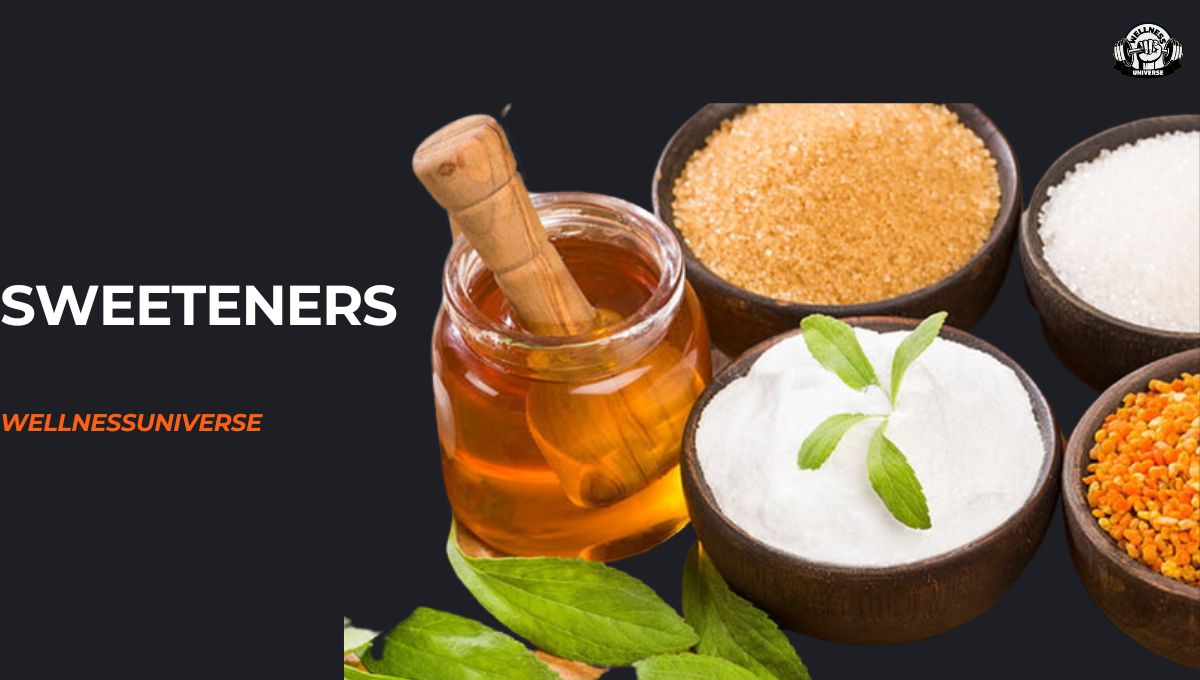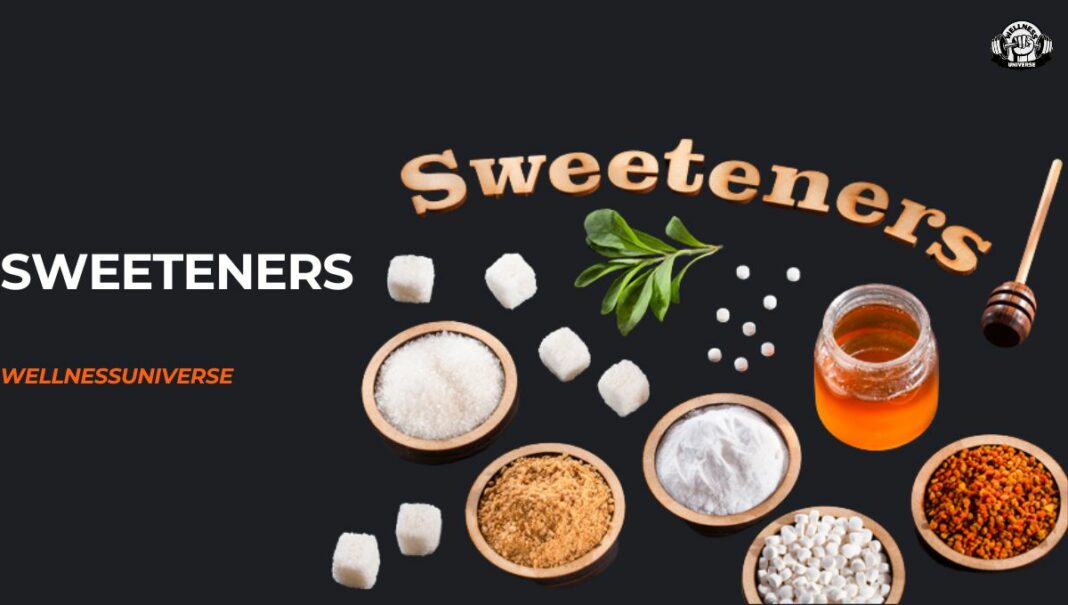Understanding Sweeteners: Sweeteners, also known as sugar substitutes or sugar alternatives, are substances used to add sweetness to foods and beverages without the added calories that come from regular sugar. They play a crucial role in providing sweetness to various products, from sodas and desserts to condiments and processed foods. Sweeteners are an attractive option for individuals who are looking to reduce their sugar intake, manage their weight, or control their blood sugar levels, especially for those with conditions like diabetes.
The Sweetener Landscape: The world of sweeteners is vast, offering a wide range of options to cater to diverse dietary preferences and health goals. The sweetener market includes both natural sweeteners derived from plants and artificial sweeteners synthesized in a laboratory. Each type of sweetener has its unique properties, taste profile, and potential benefits and drawbacks. Some of the most common sweeteners in the market include stevia, aspartame, sucralose, monk fruit sweetener, erythritol, and saccharin. With a growing interest in healthier alternatives to sugar, sweeteners have gained significant popularity in recent years. This blog will explore the different sweetener types, their uses, safety considerations, and how they fit into a balanced diet.
Types of Sweeteners

Artificial Sweeteners: Artificial sweeteners, also known as non-nutritive sweeteners or sugar substitutes, are synthetic compounds designed to mimic the sweetness of sugar without the added calories. They are much sweeter than sugar, so only small amounts are needed to achieve the desired level of sweetness. Some common examples of artificial sweeteners include:
- Aspartame: This low-calorie sweetener is widely used in various food and beverage products, including diet sodas, desserts, and sugar-free chewing gum. It is approximately 200 times sweeter than sucrose (table sugar) and is broken down by the body into aspartic acid, phenylalanine, and methanol.
- Sucralose: Sucralose is a popular sweetener known for its stability under high temperatures, making it suitable for cooking and baking. It is around 600 times sweeter than sugar and is not broken down by the body for energy, making it non-caloric.
- Saccharin: One of the oldest artificial sweeteners, saccharin is approximately 300 to 400 times sweeter than sugar. It is often used in diet beverages and tabletop sweeteners.
Natural Sweeteners: Natural sweeteners are derived from plants or other natural sources and offer a more wholesome alternative to artificial sweeteners. They are often used as a sugar substitute in various food and beverage products. Some common examples of natural sweeteners include:
- Stevia: Stevia is a natural sweetener extracted from the leaves of the Stevia rebaudiana plant. It is incredibly sweet, up to 200-300 times sweeter than sugar. Stevia has gained popularity as a natural sugar substitute due to its minimal impact on blood sugar levels.
- Monk Fruit Sweetener: Monk fruit sweetener, also known as Luo Han Guo, is derived from the monk fruit (Siraitia grosvenorii). It is incredibly sweet without providing calories and is often used in combination with other sweeteners to enhance sweetness.
- Erythritol: Erythritol is a sugar alcohol found naturally in some fruits. It is considered a natural sweetener due to its extraction from natural sources. Erythritol has about 70% of the sweetness of sugar and is virtually calorie-free.
Each type of sweetener has its unique taste profile and characteristics, making them suitable for different culinary applications. Understanding the differences between artificial and natural sweeteners can help individuals make informed choices about their sugar intake and dietary preferences. As with any food additive, moderation and balanced consumption are key to maintaining a healthy diet.
Safety and Health Concerns
Debunking Myths: Over the years, sweeteners have been the subject of various myths and misconceptions. Let’s address some of the common concerns and set the record straight:
- Cancer Risk: One of the most prevalent misconceptions is that sweeteners, particularly artificial ones like aspartame and saccharin, can cause cancer. However, numerous scientific studies and regulatory authorities, such as the U.S. Food and Drug Administration (FDA) and the European Food Safety Authority (EFSA), have extensively reviewed these sweeteners and concluded that they are safe for consumption.
- Weight Gain: Some people worry that using sweeteners may lead to weight gain. However, the reality is that most sweeteners, especially non-nutritive ones like sucralose and stevia, have little to no calories. When used as part of a balanced diet, they can help manage calorie intake and reduce overall sugar consumption.
- Impact on Blood Sugar: There is a misconception that all sweeteners raise blood sugar levels. In reality, artificial sweeteners like sucralose and saccharin do not affect blood glucose and can be suitable sugar substitutes for individuals with diabetes.
The Science of Sweeteners: Extensive research has been conducted to evaluate the safety of sweeteners, and regulatory agencies worldwide have set acceptable daily intake levels for each type. The FDA, EFSA, and other health organizations have concluded that approved sweeteners, when used within these limits, are safe for the general population.
However, it’s essential to recognize that individual responses to sweeteners can vary. Some people may experience digestive discomfort or headaches after consuming certain sweeteners, such as sugar alcohols like erythritol. If you have concerns or experience adverse effects, it’s best to consult with a healthcare professional.
Furthermore, it is crucial to maintain a balanced and varied diet, even when using sweeteners. Relying solely on sweeteners to replace all sources of added sugars in the diet may not be the best approach. A well-rounded diet with whole foods is key to overall health and nutrition.
As with any food or beverage, moderation is key. While sweeteners can be beneficial for individuals looking to reduce sugar intake or manage certain health conditions, consuming them in excessive amounts may not offer additional benefits. A balanced approach to sweeteners and overall dietary habits will contribute to a healthier lifestyle.
Sweeteners and Weight Management
Sweeteners for Weight Loss: The relationship between sweeteners and weight management has been a topic of interest for those seeking to reduce their calorie intake and control their weight. Sweeteners are often used as sugar substitutes in various food and beverage products, marketed as “low-calorie” or “sugar-free” alternatives. While sweeteners themselves are lower in calories compared to sugar, the impact on weight loss varies depending on individual dietary habits and overall lifestyle.
Studies on the effectiveness of sweeteners for weight loss have yielded mixed results. Some research suggests that using sweeteners in place of sugar can lead to a reduction in overall calorie intake, potentially supporting weight loss efforts. By replacing high-calorie sugar with low-calorie sweeteners, individuals can still enjoy sweet-tasting foods and beverages without the extra calories.
However, it’s essential to note that the success of weight management depends on a holistic approach, including a balanced diet, regular physical activity, and overall calorie control. Relying solely on sweeteners while neglecting other aspects of a healthy lifestyle may not yield significant weight loss results.
Sweeteners and Blood Sugar: For individuals with diabetes, monitoring blood sugar levels is crucial to managing their condition effectively. Sweeteners are often recommended as sugar substitutes for individuals with diabetes because they do not significantly affect blood glucose levels. Artificial sweeteners like sucralose, aspartame, and saccharin have a minimal impact on blood sugar and can be suitable alternatives to sugar for those with diabetes.
Natural sweeteners like stevia and monk fruit are also considered safe for people with diabetes, as they do not raise blood glucose levels. These sweeteners can be used in cooking, baking, and beverages to provide sweetness without the added sugar.
However, it’s important to remember that individual responses to sweeteners can vary. Some people may find that certain sweeteners have a slight effect on their blood sugar levels, while others may not experience any changes. If you have diabetes, it’s essential to monitor your blood sugar carefully and consult with a healthcare professional to determine the best sweeteners for your specific needs.
Overall, sweeteners can be valuable tools for individuals looking to reduce their sugar intake, manage weight, or control blood sugar levels. However, like any dietary choice, it’s best to use sweeteners in moderation as part of a balanced and healthy diet. If you have specific health concerns or conditions, consulting with a healthcare professional or registered dietitian can provide personalized guidance on incorporating sweeteners into your diet safely and effectively.
Artificial Sweeteners vs. Natural Sweeteners
Comparing the Taste and Texture: Artificial sweeteners and natural sweeteners each have unique characteristics that distinguish them in terms of taste and texture.
Artificial Sweeteners: Artificial sweeteners are synthetic sugar substitutes that are many times sweeter than sugar. They are often used in very small quantities because of their intense sweetness. Some common artificial sweeteners include sucralose, aspartame, saccharin, and acesulfame potassium (Ace-K). One of the main advantages of artificial sweeteners is that they provide sweetness without contributing to calories or carbohydrates, making them attractive options for those seeking to reduce their calorie intake or manage blood sugar levels.
However, some individuals may detect a slight aftertaste with certain artificial sweeteners, which can vary depending on personal sensitivity. Some people find the taste of certain artificial sweeteners less appealing than others, and individual preferences play a significant role in determining which sweetener is preferred in various food and beverage applications.
Natural Sweeteners: Natural sweeteners, as the name suggests, are derived from natural sources such as plants or fruits. They are often less sweet than sugar, and some natural sweeteners like honey, maple syrup, and agave nectar may contain small amounts of nutrients and antioxidants. Other popular natural sweeteners include stevia, derived from the leaves of the stevia plant, and monk fruit sweetener, made from monk fruit extract.
Natural sweeteners are generally considered safe, and some people find their taste profile more similar to that of sugar compared to artificial sweeteners. They can be used in various recipes, baking, and cooking, providing a natural sweetness without the use of synthetic chemicals.
Making the Choice: Deciding between artificial and natural sweeteners often comes down to individual preferences and health factors.
- Preferences: Taste is subjective, and some individuals may prefer the taste of artificial sweeteners, while others gravitate towards the flavor of natural sweeteners. It’s essential to try different sweeteners and see which ones best suit your taste preferences in various applications.
- Health Factors: When choosing sweeteners, considering health factors is crucial. Artificial sweeteners are non-caloric and do not impact blood sugar levels, making them suitable for individuals with diabetes or those watching their calorie intake. However, some people may be sensitive to the aftertaste of certain artificial sweeteners.
On the other hand, natural sweeteners may contain small amounts of nutrients and may be less processed than artificial ones. They can be a better option for those seeking a more natural alternative to sugar. However, natural sweeteners still contribute to calories and carbohydrates, so portion control is essential.
Ultimately, the key to using sweeteners wisely is moderation. Whether you choose artificial or natural sweeteners, using them in appropriate amounts as part of a balanced diet is essential for overall health and well-being. As with any dietary choice, consulting with a registered dietitian or healthcare professional can provide personalized guidance on incorporating sweeteners into your diet in a way that aligns with your health goals and preferences.
The Future of Sweeteners
Emerging Sweetener Trends: As technology and research continue to advance, the world of sweeteners is constantly evolving, and new options are entering the market. Some emerging sweetener trends to keep an eye on include:
- Allulose: Allulose is a naturally occurring sugar that tastes like regular sugar but contains very few calories and carbohydrates. It is increasingly being used as a sweetener in various food and beverage products, particularly in low-calorie and sugar-free options.
- Stevia Blends: Manufacturers are experimenting with blends of stevia and other natural sweeteners to improve the taste and texture of sweetened products. These blends aim to offer a more well-rounded sweetness profile while minimizing any potential aftertaste associated with stevia.
- Monk Fruit Blends: Similar to stevia blends, monk fruit is combined with other sweeteners to enhance sweetness while reducing any lingering taste concerns.
- Plant-Based Sweeteners: With a growing focus on natural and plant-based ingredients, sweeteners derived from various plants are gaining popularity. Examples include yacon syrup, derived from the yacon plant, and coconut sugar, made from the sap of coconut palm trees.
The Evolution of Sweeteners: The future of sweeteners is expected to witness significant advancements in response to consumer demands for healthier and more natural options. Some predicted future developments in the sweetener landscape include:
- Cleaner Labeling: Consumers are increasingly seeking transparency in food labeling. Sweeteners that have a clean label with recognizable and minimal ingredients are likely to gain traction.
- Improved Taste Profiles: Sweetener manufacturers will continue to work on enhancing taste profiles to achieve a more natural and sugar-like sweetness without any undesirable aftertaste.
- Better Stability in Cooking and Baking: Advancements in sweetener formulations will likely lead to options that are more stable under high heat, making them ideal for cooking and baking applications.
- Personalized Sweeteners: As personalized nutrition becomes more prevalent, the possibility of personalized sweeteners tailored to individual taste preferences and health needs may emerge.
- Sustainable Sweeteners: With a heightened focus on sustainability, the development of sweeteners with minimal environmental impact and sustainable sourcing may become a priority.
The future of sweeteners is exciting and promises a wide range of options to suit various dietary preferences and health goals. As new sweeteners hit the market, consumers can expect more choices to create delicious and satisfying food and beverage experiences without compromising on taste or health. Individuals need to stay informed about the latest research and consult with healthcare professionals or registered dietitians when incorporating sweeteners into their diets, especially for those with specific health conditions or dietary restrictions.
In Crux
A Balanced Approach: As we delve into the world of sweeteners, it becomes evident that these sugar substitutes offer a plethora of options for those seeking to reduce their sugar intake or manage specific health conditions. However, it is essential to approach sweetener usage with a balanced perspective. While sweeteners can be valuable tools in maintaining a healthier lifestyle, they should not be seen as a complete replacement for a well-rounded diet.
Moderation and Awareness: Moderation is key when incorporating sweeteners into your daily routine. Being aware of the types of sweeteners you are consuming, their respective health effects and the potential risks and benefits will help you make more informed choices. Always read food labels carefully to understand the sweeteners used in various products.
Remember that sweeteners, whether artificial or natural, are not a license to indulge without restraint. The goal is to strike a balance between satisfying your sweet cravings and maintaining overall health. Incorporating naturally sweet foods like fruits into your diet can also help curb your sweet tooth while providing essential nutrients.
Additionally, if you have specific health concerns, such as diabetes or allergies, consult with a healthcare professional or a registered dietitian to determine the best sweetener options for your unique needs.
In conclusion, sweeteners can be valuable additions to your diet when used mindfully and in moderation. By making informed decisions and being conscious of your sweetener choices, you can enjoy the pleasure of sweetness without compromising your health. As with any aspect of nutrition, balance, and awareness are the keys to a healthier and more satisfying lifestyle.
Thank you for joining us on this fitness journey! We hope you found our The Sweet Truth: Are Artificial Sweeteners Safe or Risky?? blog insightful and inspiring. Our aim is to provide you with valuable information, expert advice, and motivational content to support you in your wellness endeavors.
Related Post :-
- How To Do Wall Pushups
- Hand Size Demystified
- CrossFit Unleashed
- Barbell Lunges
- Forearm Fortitude
- Kettlebell Circuit
- Power of Personal Trainers
- Down Pull-Ups
FAQs about Sweeteners
Are sweeteners safe for consumption, and are there any health risks associated with them?
The safety of sweeteners has been extensively studied by regulatory authorities worldwide, and most sweeteners are considered safe for consumption when used within recommended levels. However, some individuals may experience side effects, such as digestive issues, with certain sweeteners. It's essential to consume sweeteners in moderation and be mindful of any adverse reactions.
What are the different types of sweeteners available in the market?
There are several types of sweeteners, including artificial sweeteners like aspartame, sucralose, and saccharin, as well as natural sweeteners like stevia, monk fruit sweetener, and erythritol. Each type of sweetener has its unique taste and uses, catering to various dietary preferences and requirements.
How do artificial sweeteners differ from natural sweeteners?
Artificial sweeteners are chemically synthesized compounds that provide sweetness without calories. On the other hand, natural sweeteners are derived from plants and may contain some calories but generally have a lower impact on blood sugar levels compared to regular sugar.
Can sweeteners help in managing weight or sugar levels for individuals with diabetes?
Sweeteners are often used in weight management and diabetes management because they offer a sweet taste without affecting blood sugar levels. However, the effectiveness may vary from person to person, and it's essential to consider overall dietary habits.
Are there any potential side effects of consuming sweeteners in excess?
Excessive consumption of some sweeteners, especially artificial ones, may cause gastrointestinal discomfort or laxative effects. It's crucial to follow the recommended daily intake levels and avoid overconsumption.
What is the recommended daily intake of sweeteners?
The acceptable daily intake of sweeteners varies depending on the type of sweetener and individual factors. Generally, regulatory agencies have established safe intake levels for each sweetener, and it's essential to follow those guidelines.
How do sweeteners affect the taste and texture of food products?
Sweeteners contribute to the sweet taste of food products, helping to mimic the flavor of sugar. They can also impact the texture and mouthfeel of certain products, such as soft drinks or baked goods.
Are there any sweeteners that are suitable for baking and cooking?
Many sweeteners, both artificial and natural, are suitable for baking and cooking. However, some sweeteners may have different properties, such as heat stability or bulkiness, which can affect the outcome of recipes. Experimenting with different sweeteners in cooking and baking can help find the best options for your needs.
What role do sweeteners play in reducing the sugar content of products?
Sweeteners play a crucial role in reducing the sugar content of products while maintaining the desired sweetness. They are especially beneficial in producing low-calorie or sugar-free food and beverage options that cater to health-conscious consumers.

Meet Pradeep Singh, your go-to guide for all things fitness, health, and motivation. With over 7 years in the field, Pradeep brings a blend of expertise and real-world experience to his writing. From workout tips to healthy living insights, he simplifies complex topics, making fitness accessible for everyone. His authentic approach and genuine passion aim to inspire and support your wellness journey. Get ready to embark on a path to a healthier lifestyle with Pradeep as your trusted companion and motivator.






















